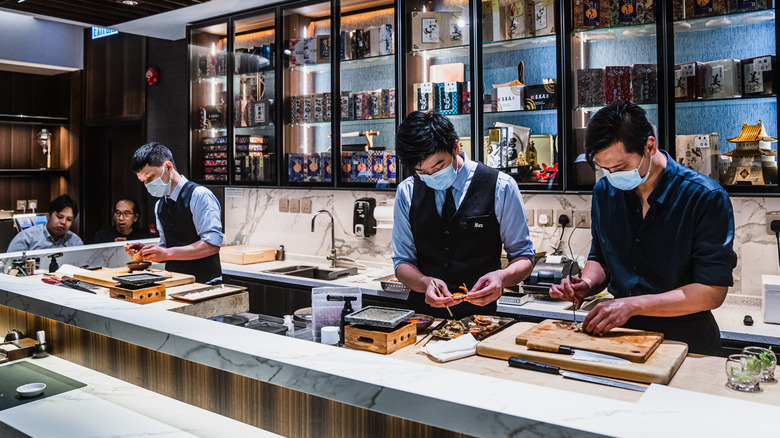Staging Is The Restaurant Industry's Unpaid Internship
By this point, we've all accepted that unpaid labor, particularly in the form of a so-called internship, is both immoral and illegal. Yet the unpaid internship persists in many competitive industries, particularly in the arts, and none of the arts are as complicit in the enforcement of unpaid labor as the culinary arts.
Built into the existing culinary industry is the practice of staging (pronounced "stah-jing"), an unpaid period of full-time restaurant work that is considered part of a young chef's formal education. The term comes from the French word "stage," which simply means internship, and people who do a stage are called stagiaires.
Though staging is legally supposed to be completed as part of a culinary education program, it really stretches the limits of how much unpaid work you're "allowed" to do, systematically taking advantage of aspiring chefs with few other options for breaking into the fine-dining world.
The purpose of staging
Staging in restaurants is presented as an opportunity for chefs in training to learn on the job, develop their skill sets, and make restaurant industry connections. It's the transition from the theory of culinary school to the muscle memory development of work in practice. But it often manifests in the real world as backbreaking work, with stagiaires often plagued with a single task for weeks or months, usually bottom-of-the-barrel work that no one else in the restaurant would be willing to do.
This practice is actually shown in season two of the popular restaurant industry show "The Bear," where two of the characters are sent off to different restaurants to hone their skills. One polishes forks for hours while the other meticulously recreates the same dessert repeatedly. But professional chefs have claimed that even this portrayal is vastly euphemistic. North Carolina Chef Eric Rivera even told The New York Times in a recent piece that in a traditional stage, "Ninety-five percent of your day is cleaning stuff, picking stuff. You're not plating dishes."
The downsides of staging
Restaurant stages are almost militaristic in their structure, designed to break young chefs down and rebuild them in the model of the extremely hierarchical French kitchen. They are part of a broader conversation about rampant abuse and exploitation in the restaurant industry, which is in the middle of a reckoning.
Many prominent chefs, even ones who have done stages themselves, are now speaking out against the process, discouraging young chefs from staging. Unlike internships, which might range from 10 to 20 hours over a semester or 40 hours for a few weeks in the summer, stages can last for months, stretching well past 40 hours a week, and might not even result in a stipend, grant, or job offer. There are frequent scenes of sexual harassment or general abuse, and big-name restaurants can wield their clout over stagiaires to discourage them from leaving since a major restaurant on a resume can be a make-or-break career move.
However, not all stages are lairs of despotic chefs with hot tempers and wandering hands. They really can provide meaningful experiences and connections to aspiring chefs. But let's admit it — they should still be paid.



